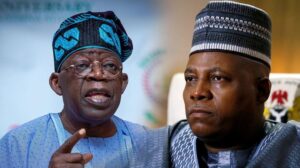A senior figure in the All Progressives Congress (APC) from Nasarawa State, Alhaji Usman Abubakar Sandaji, has advised President Bola Ahmed Tinubu to reconsider the controversial Muslim-Muslim ticket ahead of the 2027 general elections.
Speaking in an exclusive interview with Sunday Sun, Sandaji emphasized the importance of religious inclusiveness in national leadership. He urged for a presidential pairing that better reflects Nigeria’s religious diversity.
“Nigeria is a secular nation. While religion shouldn’t be the sole criterion in leadership selection, equitable representation demands a Muslim-Christian ticket next time,” Sandaji stated.
While he acknowledged that the 2023 elections operated within the legal bounds of the Constitution, he noted that strategic inclusivity and public sentiment should guide future decisions.
READ MORE: [PHOTOS] Hijrah 1447: Sacred Ceremony of Kaabah’s New Cover Unfolds in Mecca
President Tinubu’s Visit to Nasarawa: Celebrated, Yet Critiqued
Sandaji praised President Tinubu’s recent visit to Nasarawa for its peaceful conduct and successful commissioning of key infrastructure projects led by Governor Abdullahi Sule.
“The visit was a success. There was peace, overwhelming support, and the projects unveiled are of major significance,” he remarked.
Projects inaugurated included:
The Lafia Flyover to address traffic congestion
The dualization of Shendam Road
The ultra-modern Nasarawa State Secretariat—touted as one of Nigeria’s best
- Advertisement -
Another milestone highlighted was the announcement of a $400 million solid minerals processing plant, hailed as Africa’s largest, which is projected to generate over 20,000 jobs and strengthen the local economy.
Tinubu’s Political Remarks Spark Disagreement
Despite his commendation, Sandaji expressed disapproval of President Tinubu’s declaration that he would support any gubernatorial aspirant endorsed by Governor Sule in 2027.
“With all due respect, I disagree with the President. Elections are for the people to decide. In the era of electronic voting, voter choice is paramount,” he stressed.
He warned that such endorsements could lead to internal friction within the APC and potentially alienate qualified aspirants.
“All aspirants deserve a fair contest. Imposing a candidate could cause unrest and diminish our party’s chances. Let the delegates decide,” he added.
Strong Words on the Emerging Opposition
Reacting to President Tinubu’s jab at newly forming opposition coalitions, which he termed “internally displaced politicians (IDPs),” Sandaji took a more cautious stance.
“I would prefer the President encouraged vigilance. These groups should not be dismissed—they could evolve into a credible opposition. The APC must not rest on its laurels,” he warned.
He likened the political landscape to an unpredictable future:
“Politics is like a pregnant woman. You never know what will be delivered. This uncertainty should drive all parties to perform better.”
National Security: A Shifting Threat
On national security, Sandaji highlighted the changing nature of insecurity in the country—especially in the North Central region where Nasarawa and Plateau states have seen a surge in attacks.
“Terrorism has evolved. It’s now a commercial enterprise. From armed bandits to rogue elements in the security system—everyone seems to be exploiting it,” he lamented.
He advocated for the immediate establishment of state police as a practical solution to Nigeria’s growing insecurity crisis.
“State policing is no longer a debate. Even the President has acknowledged its necessity. We need security forces that understand their local terrains. Federal forces alone can’t fix this.”
He also stressed the need for grassroots vigilance and community responsibility.
“Some locals aid banditry by supplying logistics. This must stop. Community accountability is key. We must all be alert—if you see something, say something.”
A Call for Sincere Leadership Ahead of 2027

Looking ahead to the next elections, Sandaji emphasized unity within the APC and called for sincere governance over political gamesmanship.
“This is not the time for flattery or favoritism. Nigeria needs real leadership. The people are watching, and in 2027, their votes will count more than ever,” he concluded.
Final Thought:
Alhaji Sandaji’s bold remarks reflect a growing sentiment among political insiders: Nigeria’s complex diversity must be reflected in its leadership structure. As 2027 draws closer, calls for inclusivity, security reform, and democratic integrity are becoming louder—and harder to ignore.





